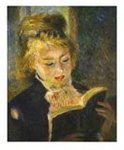I've been wanting to read
The Echo Maker for several reasons. I always like to read novels that are set close to where I grew up--on the prairie in the Colorado/Nebraska/Kansas region. This novel is set in Kearney, Nebraska, where my sister currently lives.
I like to read award-winning novels, and
The Echo Maker won the 2006 National Book Award. Also, it is one of the books in the
New York Times Notable Book Challenge, in which I am participating. Lastly, it concerns Capgras and Cotard's Syndromes, and I have an intense interest in these because I know a person who experienced them.
Warning: there may be some minor spoilers below.
Mark Schluter has been in a rollover accident and has sustained a severe head injury. As Mark starts to get better, he insists that his sister is an impostor. He also doesn't recognize his dog, Blackie. He begins to think that his home has been duplicated and perhaps the whole community has as well.
His sister Karin (Mark calls her Kopy Karin and Karbon Karin) is devastated when he refuses to accept her as his sister, and she calls in a nationally known doctor who has written several popular books on brain disorders. "Shrinky" as Mark calls him, comes to Kearney, runs a few tests, consults with Mark's doctor, and then goes home. Is he truly interested in Mark's case or does he just want another "story" for his new book? Mark does trust "Shrinky," though, as well as his nurse's aide Barbara--two people he did not know before the accident. Much of Mark's time is spent trying to figure out who wrote a mysterious note found on his nightstand in the hospital.
"I am No One but Tonight on North Line RoadGOD led me to you so You could live and bring back someone else."We do find out who wrote the note, how the accident occurred, and if Mark gets well again. Contrary to some bad reviews of the book, I liked how the characters were developed--even if some weren't likable. While I was interested in the various characters' thoughts and feelings, I thought some of it extraneous. I appreciated the setting (of course) and the descriptions of the birds. I didn't like the vulgar language and s*xual content, but I guess that is the norm in a modern novel today.
Also, I'm not sure why, when referring to prairie farm people, certain very negative subjects have to always be brought up. The people I know from the area are the most decent in the entire USA, and I'm always sad to see it when they are portrayed with negative qualities that might occur in less than 0.5% of the population of the region.
All in all, I'm glad I read the novel because of the reasons I stated in the first paragraph. I'm not sure that most readers would appreciate it, though.
Note: After doing a little research after I read the book, I found a book that contains very similar individual case descriptions that are mentioned in The Echo Maker:
Phantoms in the Brain: Probing the Mysteries of the Human Mind By V.S. Ramachandran, M.D., Ph.D., and Sandra Blakeslee. New York, William Morrow, 1998, 328 pp.2006, 451 pp.
Rating: 4
 The Giver
The Giver





